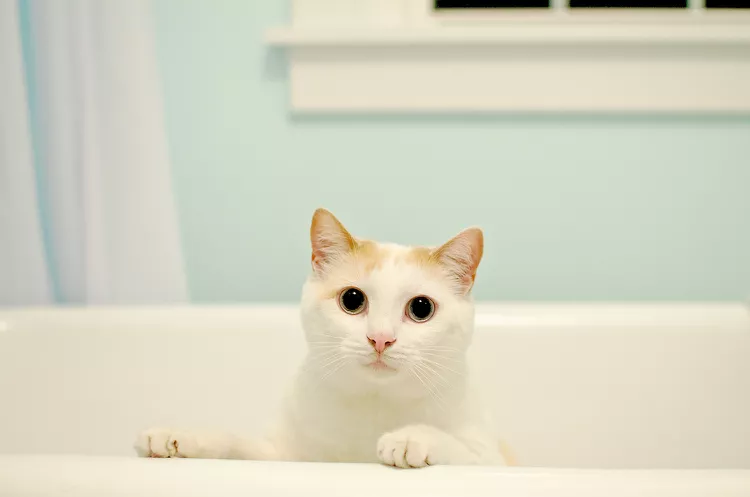
Cats naturally urinate in a litter box but if they have a reason to avoid the litter box they often choose the bath tub as an alternative. The reasons why there may be litter box avoidance can vary from a simple lack of cleanliness to a life threatening condition. Due to the serious reasons for this problem, it's important for cat owners to know why their cat is peeing in the bath tub.
The act of not wanting to pee in the litter box is called litter box avoidance and it is a common occurrence in cats. If a cat associates its litter box with a negative experience it may decide to pee outside the box or in the bath tub. The bath tub is like a large, clean, litter box to a cat so it is an obvious second choice for many felines.
Sometimes peeing in the bath tub is a one time occurrence but other times it becomes a regular habit for a cat. The reasons why a cat may pee in a bath tub can serve as a check list for a cat owner to find the root of the problem and potentially correct it before more serious issues occur.
The best way to stop a cat from peeing in the bath tub is to fix the problem that is causing the litter box avoidance in the first place. This may mean a vet visit is in order to rule out any health problems, cleaning the litter box, adding another litter box, changing the placement of the litter box to give your cat more privacy, or even switching to an unscented litter if you are currently using a scented variety. If a health problem is the reason for the litter box avoidance, your veterinarian will recommend the proper course of action which may include medications, dietary changes, or other lifestyle alterations.

Everything You Need to Know About Raising Your First Cat
Whether you are thinking about getting a cat or just adopted your first one, these are the things to know to make your relationship a lasting one.
8 Ways To Help Your Cat Lose Weight
Cats who are at a healthy weight are happier, more agile, and tend to live longer. Here are 8 tips for managing a cat weight loss programme
Heart Disease in Cats
Like humans, cats can get heart diseases that may lead to serious problems. Learn all about symptoms along with the causes, treatment, and prevention.
Is Coconut Oil Safe for Cats?
Coconut oil is touted as a miracle food. Can coconut oil improve your cat's health? Is coconut oil even safe for cats?
Taurine for Cats
Taurine is an essential animal protein in your cat's diet. Learn more about the various ways it supports your feline's body.
Can Cats Eat Peanut Butter?
Peanut butter is not toxic to cats, but it might not be the best choice of treat for them.
Why Do Cats Stare at Walls?
Cats can have some quirky behaviors, including staring at walls. Why do cats do this and when should you be concerned?
Patellar Luxation in Dogs
If your dog has a knee that seems to pop out of place, it may have a patellar luxation. Find out what this means and what can be done about it.
13 Signs of Cancer in Dogs
The signs of cancer in dogs may include lumps and bumps, lethargy, vomiting, diarrhea, pain, abdominal swelling, and more. Signs may be mild or obvious depending on the type of cancer and its severity. Learn common signs of cancer in dogs so you’ll know when to call the vet.
Ear Mites in Puppies and Dogs
Ear mites can be a big discomfort for puppies and dogs. Learn about the causes, treatment, and prevention to keep mites away from your pets.
Why Do Dogs Eat Dirt?
Some dogs eat some strange things. What does it mean if your dog eats dirt and when should you be concerned?
200 Tortoiseshell Cat Names for Your Bi-Colored Kitty
Tortoiseshell cats are a rare phenomenon and deserve a fitting name. We've pulled together 200 tortoiseshell cat names, including male names, female names, cute names, and names inspired by their coat color and pattern.
How to Manage Your Cat's Claws
Here are ways you can help your cat maintain healthy claws while protecting your furniture at the same time.
Hair Loss in Cats
Hair loss in cats is a common problem with many possible causes. Learn the causes, treatments, and prevention of hair loss in cats, also known as alopecia.
Neurological Disorders in Cats
Neurological disorders in cats range from minor to serious. Any neurological condition is a major disruption to your cat's central nervous system. Learn the causes, treatment, and prevention of neurological disorders in cats.
Hair Loss on Hind Legs in Cats
Cats experience hair loss on their hind legs for a variety of reasons. Learn about potential causes, treatments, and ways to prevent it.
Can Cats Have Milk? Why They Really Shouldn’t Drink The Stuff
Despite what we’ve learned from pop culture, cats shouldn’t drink milk as most cats are lactose intolerant. Learn more about feeding milk to cats and alternatives you can feed your cat instead.
Can Cats Eat Dog Food?
Can cats eat dog food? In small amounts, it's unlikely to be a problem, but long-term feeding of dog food to cats can cause health issues and malnutrition.
Why Some Black Cats Look Different in the Sun
Some black cats look different in the sunlight. Whether it's cat genetics, a mutation, or a summer "rust," learn why they appear to have another coat.
Training Your Fearful Cat to Be Confident
Cats can become scared for any number of reasons. Learn about techniques that can help your fearful cat and reduce its anxiety so kitty lives a happy life.